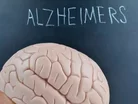Australian scientists discover way to diagnose Alzheimer's disease earlier

Australian researchers have found biochemical changes occurring in the blood, in the rare inherited form of Alzheimer’s disease. Changes in these fat-like substances, may suggest a method to diagnose all forms of Alzheimer’s disease before significant damage to the brain occurs.
RELATED TOPIC: Nestlé, AC Immune collaborate to fight against Alzheimer's disease
In a recent article published in the Journal of Alzheimer’s disease, the Australian team led by Professor Ralph Martins from the CRC for Mental Health and Edith Cowan University, examined the lipid profiles of 20 people who carry a mutation responsible for the rare inherited form of Alzheimer’s, known as familial Alzheimer’s disease.
Using samples from the Dominantly Inherited Alzheimer Network (DIAN) study, the researchers found that people who carried the mutation responsible for this form of Alzheimer’s also had altered levels of specific lipids in their blood plasma compared to the control group. This pilot study, combined with previously published studies on lipids in the most common form of Alzheimer’s disease, suggests that that specific changes in lipid metabolism may be used as a predictive test for Alzheimer’s disease.
RELATED TOPIC: How Australian researchers' 'bionic spine' will help paraplegics
At present, the most common, sporadic form of Alzheimer’s disease is difficult to diagnose until symptoms are readily apparent and significant damage to the brain has occurred; findings from this study may provide clues to suitable diagnostic markers. While the results are exciting, the researchers involved urge caution due to the pilot nature of the study.
Click here to read the latest edition of Healthcare Global magazine!
- Healthcare Digital news roundup: pharma & supply chainsMedical Devices & Pharma
- Cervical screening self tests should be available worldwideMedical Devices & Pharma
- Australian digital healthcare capital fund launchesDigital Healthcare
- Australia's newest smart hospital deploys automation techHospitals





